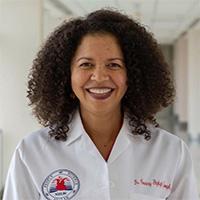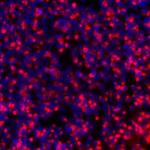
Courtney Fitzhugh, M.D.
Lasker Clinical Research Scholar
Early Sickle Mortality Prevention
NHLBI
Research Topics
Dr. Fitzhugh is exploring new avenues of hematopoietic cell transplantation (HCT) for sickle cell disease (SCD), while also studying the long-term health effects of curative therapies for SCD.
Currently, HCT offers the only real cure for patients with SCD, though the transplantation procedure can only be applied to select people and carries its own health risks. One risk is that traditional stem cell transplants involve high-dose chemotherapy, which many adults with SCD cannot tolerate due to pre-existing organ damage. Dr. Fitzhugh and her team have been developing an alternative approach where patients receive agents that focus on eradicating the immune system and making space in the bone marrow while avoiding high-dose chemotherapy. Dr. Fitzhugh has demonstrated the efficacy of this non-myeloablative procedure in both mice and human volunteers and is currently participating in a long-term follow-up study with patients to see if they remain free of SCD.
Dr. Fitzhugh is also conducting a half-matched protocol to increase the number of people eligible for HCT. The current procedure requires a fully HLA-matched sibling donor, and less than 15% of patients with SCD would qualify. Through a half-matched donor protocol, 90% of patients have parents, children, and siblings who could serve as stem cell donors. However, the immune system barriers and potential complications are greater. Dr. Fitzhugh is currently examining the feasibility of this approach in a clinical pilot study that includes patients with compromised organ function.
Dr. Fitzhugh is also interested in learning more about the long-term health effects of curative therapies in patients with SCD. Her team has shown in small studies that heart morphology improves, tricuspid regurgitant jet velocity decreases, and kidney function remains normal after non-myeloablative HCT with follow-up of up to 3 years. Dr. Fitzhugh is collaborating with investigators to study the impact of curative therapies on organ function and also leads an NIH study to deeply phenotype major organs in patients with SCD who undergo HCT or receive standard treatment.
Lastly, myelodysplastic syndrome and acute myeloid leukemia incidence is higher than expected after graft rejection and gene therapy for SCD. Dr. Fitzhugh and her team have shown that TP53 mutations found at the time of myeloid malignancy diagnosis were present at baseline in a few patients. Further, the incidence of myeloid malignancies is higher after graft failure and mixed donor/recipient chimerism. They are now interested in exploring genetic risk factors for myeloid malignancy development after curative therapies for SCD. The goal of the clinical HCT protocols is full donor chimerism and not mixed chimerism. Altogether, Dr. Fitzhugh’s group seeks to develop a personalized approach to curative therapies for SCD.
Biography
Courtney Fitzhugh received her B.S. magna cum laude from the University of California, Los Angeles in 1996, and her M.D. from the University of California, San Francisco in 2001. During medical school, Dr. Fitzhugh participated in the NIH Clinical Research Training Program, where she studied with Dr. John Tisdale in NIDDK/NHLBI. After receiving her M.D., Dr. Fitzhugh completed a joint residency in internal medicine and pediatrics at Duke University Medical Center, and in 2005 she did a combined adult hematology and pediatric hematology-oncology fellowship at the NIH and Johns Hopkins Hospital. Dr. Fitzhugh returned to the NHLBI in 2007 and was appointed as Assistant Clinical Investigator in 2012 and Lasker Clinical Research Scholar as a Clinical Tenure Track Investigator in 2016. She is a member of the American Society of Hematology and the American Society of Transplantation and Cellular Therapy.
Selected Publications
- Lawal RA, Mukherjee D, Limerick EM, Coles W, Hsieh MM, Dillon LW, Hourigan CS, Fitzhugh CD. Increased incidence of hematologic malignancies in SCD after HCT in adults with graft failure and mixed chimerism. Blood. 2022;140(23):2514-2518.
- Ghannam JY, Xu X, Maric I, Dillon L, Li Y, Hsieh MM, Hourigan CS, Fitzhugh CD. Baseline TP53 mutations in adults with SCD developing myeloid malignancy following hematopoietic cell transplantation. Blood. 2020;135(14):1185-1188.
- Ali MAE, Limerick EM, Hsieh MM, Upadhyaya K, Xu X, Phang O, Mukendi JPK, Calvo KR, Lopez-Ocasio M, Dagur P, Fitzhugh CD. Recipient Cells Are the Source of Hematologic Malignancies After Graft Failure and Mixed Chimerism in Adults With SCD. Am J Hematol. 2025;100(5):903-905.
- Sachdev V, Limerick E, Nguyen ML, Li W, Jeffries N, Ramachandra S, Tofovic D, Rondelli D, Al Zahrani M, Aljizeeri A, Saraf S, Hsieh M, Fitzhugh CD. Cardiac effects 2 years after successful non-myeloablative human leukocyte antigen-matched related donor hematopoietic cell transplants in sickle cell disease. Am J Hematol. 2023;98(8):E219-E221.
- Fitzhugh CD, Hsieh MM, Taylor T, Coles W, Roskom K, Wilson D, Wright E, Jeffries N, Gamper CJ, Powell J, Luznik L, Tisdale JF. Cyclophosphamide improves engraftment in patients with SCD and severe organ damage who undergo haploidentical PBSCT. Blood Adv. 2017;1(11):652-661.
Related Scientific Focus Areas
This page was last updated on Thursday, August 21, 2025




